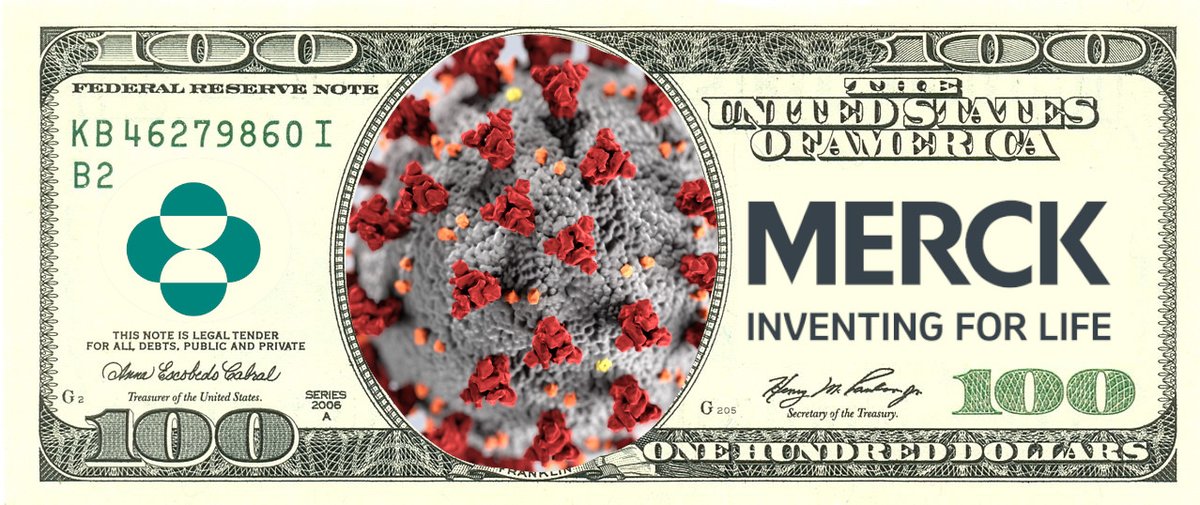
Comparing the government to a household or a business isn't merely inapt (a government is a currency creator, while a household is a currency user - their budgeting constraints are totally unrelated) - it's also profoundly dishonest.
1/
1/

If you'd like an unrolled version of this thread to read or share, here's a link to it on pluralistic.net, my surveillance-free, ad-free, tracker-free blog:
pluralistic.net/2021/10/06/mer…
2/
pluralistic.net/2021/10/06/mer…
2/
Like, if you really are worried about government "living beyond its means," then you should freak out every time Congress writes a $715B no-strings-attached check to the Pentagon, or sends $258B to the ultra-rich as part of the CARES Act.
propublica.org/article/the-ca…
3/
propublica.org/article/the-ca…
3/
If the government is like a household that can "charge too much to its credit card," then it shouldn't matter whether the spending is going for universal pre-K and Medicare for All or junk bonds and a $1T fighter jet that can't even fly.
nytimes.com/2019/08/21/mag…
4/
nytimes.com/2019/08/21/mag…
4/
The household analogy only arises for our ability to house, feed, clothe, educate and care for each other - when it comes to corporate subsidies and blank checks for Beltway Bandits, the whole establishment converts to (transient, highly selective, ardent) adherence to #MMT.
5/
5/
The same is true when we talk about running government like a business, another thing the government is nothing like, and another analogy that is only raised to justify shredding the social safety net, and jettisoned when it comes to handing billions to giant corporations.
6/
6/
Take @Merck's blockbuster covid therapeutic drug #molnupiravir, whimsically named for Thor's hammer, which made headlines after a trial in which it was 100% successful in preventing death in covid patients.
scholar.harvard.edu/files/melissab…
7/
scholar.harvard.edu/files/melissab…
7/
A five-day course of Molnupiravir costs $17.74 to produce. Americans - and Medicare, and US insurers - will pay $712 to receive a five-day course of the drug, representing a tidy 4,000% profit for Merck.
8/
8/
But of course, the cost of Molnupiravir isn't merely the cost of production - the major cost is the high-risk capital that was used to fund the initial development and testing. In the world of business, the investor who bears that risk should reap the reward.
Right?
9/
Right?
9/
Here's the thing: that investor was the US government. Molnupiravir was developed at public expense at @EmoryUniversity, which received $10M from the DoD between 2013-15 and another $19M from the NIH. That's a $29M public subsidy into early-stage, high-risk research.
10/
10/
If the US government should be run like a business, then we are the angel investors. Sure other investors came in afterwards - after our investment had vastly reduced the risk - like Ridgeback, who bought the rights from Emory in 2020 and flipped them to Merck.
11/
11/
Like all follow-on investors, Ridgeback and Merck should expect to pay more money for a smaller share. The angel investors' share will be diluted, of course, but only a little. We angel investors took all the risk, and the majority of the reward is rightfully ours.
12/
12/
But that's not what people who say "we should run the government like a business" mean. The business in question isn't a startup with shrewd investors.
13/
13/
Rather, it's more like a schlock Hollywood film, the kind that's funded by star-struck midwestern dentists who are stupid enough to agree to a share of the "net profits" and get nothing, not even a free ticket to the premiere.
14/
14/
If the US government is a business, then American public are the suckers at the table, the marks who get hustled into paying for everything in exchange for nothing, not even the bragging rights. Our contribution is treated as both beneath mention and literally unmentionable.
15/
15/
That's why the pronouncements about Molnupiravir are all misleading statements from Ridgeback and Merck about how they self-funded, and why the only reason we discovered the public origins of the drug was because of crack research from @KEI_DC.
keionline.org/36648
16/
keionline.org/36648
16/
Merck and Ridgeback stand to make $7 billion from Molnupiravir this YEAR, and the majority of that money will come from Americans paying $712 to take a $17 drug that they already shelled out $29m to develop.
qz.com/2068247/merck-…
17/
qz.com/2068247/merck-…
17/
Most of those profits WON'T come from abroad - because, as @micahlee points out for @theintercept, people in other countries will enjoy a full course for a mere $12, courtesy of a giant Indian generics factory.
theintercept.com/2021/10/05/cov…
18/
theintercept.com/2021/10/05/cov…
18/
America isn't a business. The US government funded the basic research into this because if we left things up to business, we would be royally fucked. Businesses are risk averse and cowardly and do not fund the science that uplifts us.
19/
19/
As @MazzucatoM documents in her landmark 2013 book "The Entrepreneurial State," every successful American company owes its existence to a vast public subsidy - a subsidy that is routinely erased.
marianamazzucato.com/books/the-entr…
20/
marianamazzucato.com/books/the-entr…
20/
We MUST erase it. If we acknowledge it, we'd know the LAST thing we want is for the government to run itself like a business - we want the government to run itself like a GOVERNMENT. We want it to invest in research, and then make that research available on equitable terms.
21/
21/
We could make publicly funded work public domain - or we could condition access to publicly funded work on a maximum profit margin, say, 10% (which would price a course of Molnupiravir at $20). That is to say, we could make public research a force for public benefit.
22/
22/
Because government is not a business nor a household. It is neither a profit-maximizer nor a currency user. It is a benefit-maximizer and a currency creator - or it could be.
23/
23/
The alternative isn't a government that budgets like a household or runs like a business. It's a government that budgets like a drunken sailor (or a drunken admiral out for drinks with a military contractor's sales rep) and bargains like a star-struck midwestern dentist.
eof/
eof/
CORRECTION: The Intercept story was written by @fastlerner (Sharon Lerner), not @micahlee - my apologies. I was misled due to a rendering bug in Firefox.
• • •
Missing some Tweet in this thread? You can try to
force a refresh










